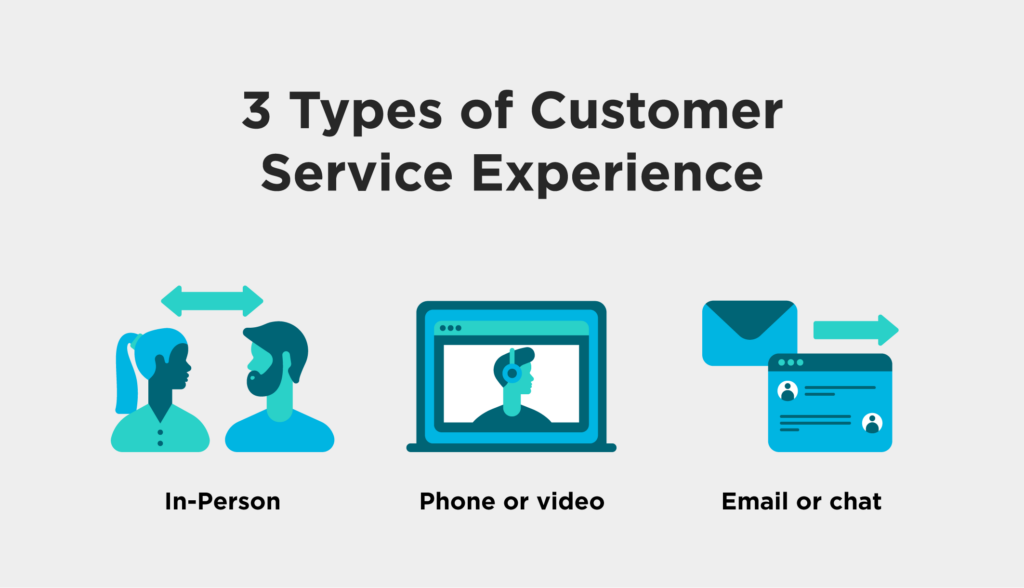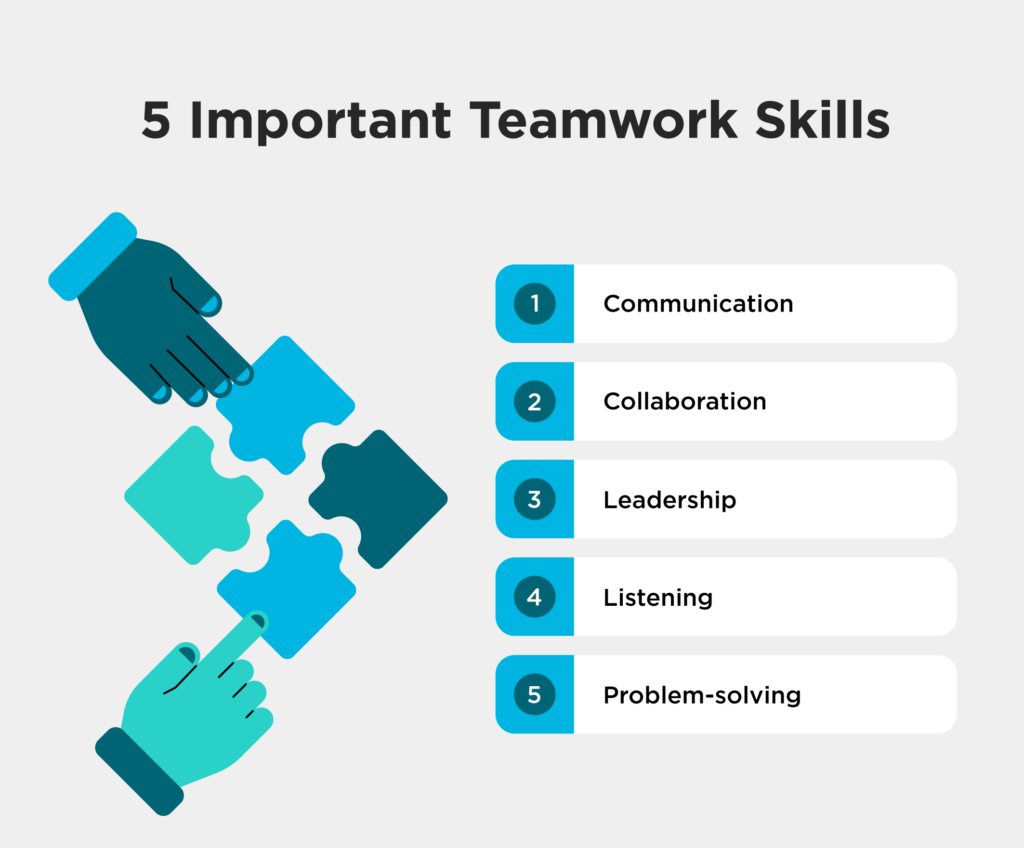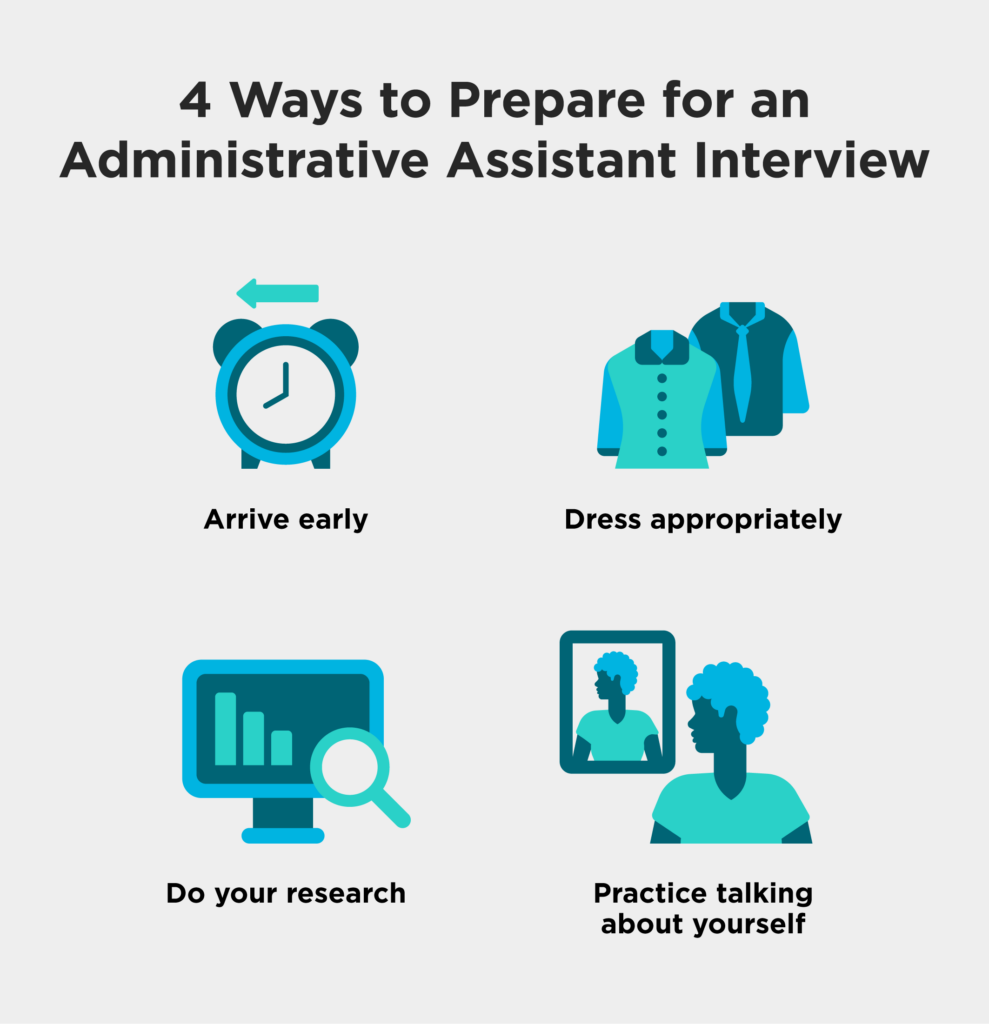17 Administrative Assistant Interview Questions [+Answers]

quick answer
Get prepared with 17 interview questions for Administrative Assistants with answers included! What's your WPM average? How do you stay organized?
In This Article
You’ve landed an interview for an Administrative Assistant role — congrats! As an administrative assistant, you’ll take on various roles throughout your career. Each one will differ depending on the industry, the company, and your specific role. You should prepare to answer a variety of Administrative Assistant interview questions.
To get started, consider the Administrative Assistant skills employers are looking for. Alongside your administrative abilities, employers want to know if you have skills in:
If you’re looking to land a job as an Administrative Assistant, you’ll want to prepare yourself for any questions that may come your way in the interview. How would you handle a new client? How do you stay organized? Are you confident in taking meeting notes? See the top 17 questions potential employers are likely to ask — and get sample answers so you’re ready for them.
Interviewers tend to ask questions that encourage you to answer with more than a yes or no. This question leaves room for the interviewee to explain how they stay organized. The interviewer might be asking about software, but they might also be asking about analog systems like:
In my previous position as an Administrative Assistant, it took a long time to find client information. I problem-solved by implementing a system for labeling drawers and color-coding folders. This positively impacted my workflow, and I received positive feedback from coworkers.
Potential follow-up questions: Have you ever worked with a system that needed improvement? What did you suggest?
The interviewer wants a clear example of your time management skills in action. Prepare an example that proves your skills and shows your reasoning. This allows interviewers to see who you are and how you work.
Your answer should be like a short story with a happy ending. Think of a specific situation at work when you managed your time well. Now, answer the following questions:
In my previous position as a Supervisor for a local drugstore, I was in charge of replacing the sales signs every Thursday night. There was a lot of work to do, and we had an issue with overtime. To manage our time better, I would print out the sales stickers on Wednesday night and instruct Thursday’s day staff to organize them by section. The outcome was an efficient process, and we stopped going into overtime as a result.
Employers may want to understand your level of experience with data management software. Popular examples include Microsoft Excel and Google Sheets. Many workplaces utilize this software for organizing sensitive business data.
Some businesses use lesser-known systems, but the data management principles will remain the same. So, be sure to mention any experience with data management software for:
For advanced roles, employers may want to know your level of experience with software for data analysis and business insights. For these roles, you must show knowledge of data models, SQL, and other database concepts.
In my previous position as an Events Coordinator, I was responsible for organizing and reporting on attendance for monthly networking events. I have experience collecting data from Eventbrite CSVs and organizing the data within Google Sheets. I am comfortable using formulas to analyze large amounts of data and provide useful insights.

Customer-facing skills and client-facing skills share a lot of the same principles. As an Administrative Assistant, you will be the face of the company, and often you are the first point of contact. This means you must make a good impression and show exceptional people skills.
Don’t worry if you have no previous Administrative Assistant experience. Holding a client-facing position is a positive sign, no matter your industry. Customer-facing jobs can include retail, sales, telemarketing, and customer service.
Try to have a story about creating positive client interactions:
I worked as a server for four years and have plenty of customer service experience. On top of waiting tables, I was in charge of greeting customers and answering the telephone. Based on the success of my work, my employer trusted me with email communication for online reservations and other customer communications.
The trick with this type of question is to avoid being negative. Your answer should keep things positive and avoid any disparaging comments about customers. The interviewer doesn’t want to hear about a negative experience — they want to know how you handle difficult situations.
Think of a time when a customer was unhappy, and you provided a solution. This will keep things positive and show you are a productive employee. Avoid any stories that don’t have a happy ending.
I was working in a furniture store when a customer became upset that their order got delayed. They felt it was unfair since nobody told them and felt that we wasted their time. I checked with my manager before offering the customer a home delivery free of charge. The customer calmed down and happily accepted the offer.
This question means to highlight your basic client-facing skills. Avoid guessing how things work at the job you are interviewing for. Instead, focus on explaining how you would handle a new client who entered a previous office or workplace.
Like most customer service jobs, you’ll want to highlight best practices. When citing examples, you should show that you:
Speaking of my previous positions, I would immediately say hello with a smile. Then I would ask how I can be of assistance. I would walk customers to a particular location if they had an appointment. If the customer had to wait, I would offer them a seat and take their coat. Then I would explain what I will do next and keep them informed until we properly served them.
As a professional, you must handle conflict with coworkers respectfully. Any story you share needs to have a positive outcome that shows the workplace remains productive.
Think of examples where you overcame a disagreement with coworkers about:
In my previous position as a Banquet Server, I had a supervisor that only provided negative feedback. I felt like I wouldn’t improve unless I received constructive criticism, so I spoke with them directly to explain myself. My supervisor apologized and explained how this was a new experience for them. Following that conversation, the supervisor started providing constructive feedback, making work much more enjoyable.
Administrative Assistants are sometimes required to take notes during meetings. Meeting notes can be a basic summary of attendance, topics of discussion, and next steps. Meeting minutes are more detailed than meeting notes — in some cases, they are transcriptions of entire conversations. Advanced law office roles will require hands-on experience, as they’ll handle important documents for legal purposes.
For a basic Administrative Assistant position, you can highlight skills related to note-taking, such as:
I am confident in taking notes and recording minutes, based on my volunteer experience for a local not-for-profit organization and my Executive Assistant Diploma. I prepared for each meeting by gathering an attendance list, the meeting agenda, and any supporting documentation. We recorded our meetings over Zoom and used a transcription service, but I would also take live notes to improve accuracy.

Teamwork skills are essential for Administrative Assistants because they interact with almost everybody in a business. Whether working with delivery people or upper management, you need to be a team player.
Teamwork skills include:
Think of a workplace experience that shows two to three of the teamwork skills above.
I used to work in sales for a large retail outlet. We did a yearly inventory audit involving departments that didn’t usually work together. We needed to break the ice, so I asked everybody to suggest music for a playlist. Everybody contributed, and the music made our work more enjoyable.
This is a question about your work style. Employers want to know about your work style to understand if you will fit into their company culture. Being flexible means your role can change daily, and employers will expect you to adapt accordingly. An example of “rigid” work parameters would be jobs in government, where the duties are consistent and predictable.
Research the companies you are interviewing for so you can understand their culture. Look at the job description and imagine if the workplace would provide you with flexible or consistent duties.
I’m a flexible worker and I like taking on new tasks. I feel comfortable adapting to a dynamic workplace, and my organizational skills help me stay focused at all times.
Software expectations usually get listed in job descriptions, but be prepared to answer questions on the fly.
If you’re familiar with the tool, say yes and explain your experience. It’s best to describe when you used the software productively at work. Personal use can be a great way to show experience and initiative if you haven’t used the software at work.
Say you are willing to learn when you don’t know the software. Even better, you can mention a similar software you use and describe your experience. This will show you are a creative thinker who already has the fundamental skills.
I’m very familiar with Google Docs. I have experience collaborating with others using the comment, suggestion, and edit tools. I have also created templates that the company uses daily for client-facing work.
The interviewer wants to know if you can use specific software for a specific purpose. This probably means it is an important duty for the role. Prepare for the interview by noting the software and duties mentioned in the job description.
Questions could be:
Yes, I’ve automated monthly newsletters using HubSpot. I created a template and organized the automation to include users’ names for a personalized approach.
Employers expect Administrative Assistants to be skilled writers, proofreaders, and editors. You will be creating emails, reports, documentation, and more. An Administrative Assistant will check for typos, grammatical errors, and anything else that could make the business look unprofessional.
More than using spell-check and Grammarly, you will be expected to craft documents independently with little guidance. Administrative Assistant Diploma programs offer courses in Business Writing to help you sharpen these in-demand skills.
I have experience writing, proofreading, and editing documents. I recently earned my Administrative Assistant Diploma where I took a course in Business Writing. From there, I gained further experience with my practicum at (X) business. While working there, I was responsible for editing reports and writing emails.
WPM stands for words per minute, and it is a measurement of how fast you can type. Administrative Assistants should work efficiently and accurately in this regard.
You can test your typing skills online with a free speed test. The average WPM speed is 40, but professionals must have a WPM speed of 65 or higher. Take a test and write down your speed to communicate this with potential employers.
I can type at an average speed of 85 words per minute. In my previous Assistant position, I wrote weekly meeting minutes quickly and accurately. I received positive feedback from my supervisor for this work.
Some employers will ask about your comfort with technology in general. Entry-level positions are your first step in a company, so they want to know how well-rounded you are. Employers don’t expect an entry-level Dental Assistant to have experience with their online medical portals, but they want to know you can learn.
Interviewers might ask more specific questions about:
It can be beneficial to have an example to prove your level of comfort with technology.
I am very comfortable using technology. As a millennial, I used technology in school and at work my whole life. When I don’t know a program, I learn how it works by reading guides and following tutorials. I enjoy learning new technologies for graphic design in my spare time.
Interviewers may want to know about your schooling and how you benefited from the experience. So, avoid listing the courses you took and focus on explaining your personal experience. This is a great opportunity to show your enthusiasm for the role you have applied for.
Try to answer these questions:
I chose Robertson College because I was eager to start a job in business and upgrade my skills. My Administrative Assistant practicum gave me the hands-on experience to be confident in my career choice. I was offered a full-time position at the end of my practicum, so I’ve been learning ever since.
This is a prompt for you to explain the valuable skills you’ve gained from your previous work experience. This includes any practicums or volunteer work experience. Try to share information related to the job you’re interviewing for.
Consider the following questions:
I had a fantastic experience working for [X] company. My role involved a lot of proofreading, so this is second nature to me. Based on my ability to connect with customers through email, I was promoted to working on the front desk where I answered the phone and greeted clients. I received positive feedback from my supervisor during our monthly all-hands meeting.
You can’t prepare for everything, but you can prepare to feel confident. Consider the following questions and how you would answer them in an interview. You can even practice answering by speaking out loud to yourself or with a friend.

Prepare a few things before your interview to feel comfortable and set yourself up for success. Nobody can predict the future, but you can prepare for any Administrative Assistant interview with these four simple tips.
Try to arrive 15 minutes early for your interview at least. Not only will this give you extra time in an unexpected situation — maybe you’re stuck in traffic, or you can’t find parking, or the interview is on the 22nd floor, and the elevator is broken—but it can also impress management.
There’s a quote from author Eric Jerome Dickey that goes, “Early is on time, on time is late, and late is unacceptable!” This is a good way to view punctuality.
There’s no universal office dress code. Every company and office environment is different, whether it’s business-formal, business-professional, business-casual, or just plain casual. For your interview, be sure to dress appropriately for that particular office.
For example, if you’re interviewing at a construction company, you might dress more casually, but if it’s at a law firm, you might throw on a blazer or suit jacket. If you’re unsure, feel free to call the company ahead and ask about the dress code! This is acceptable.
If you do only one thing to prepare for your interview, please let it be researching the company you’re about to interview for. There’s nothing worse than being asked, “So, why do you want to work here” or, “What can you tell us about our company and what we do?” and having no response. This shows the employer that you don’t care about their company.
Research the hiring business to find out:
Have at least one question prepared for the end of the interview. They’ll likely ask you if you have any questions about the job or the company. Having a question prepared will show you are interested and you do your research.
One of the first questions you might be asked is, “Tell me about yourself.” This is the best question to receive in an interview because it allows you to openly brag about yourself and all your incredible accomplishments (yes, you — you’re incredible!)
Be sure to have a few talking points prepared so you don’t waste the opportunity — this is a good time to mention any big accomplishments or awards, a few hobbies or volunteer roles, and any significant skills or achievements.
There’s no way to predict the future, but these Administrative Assistant interview questions are a good example of what to expect. Remember, it’s better to be over-prepared than underprepared. At the very least, remember to arrive early, dress appropriately, do your research, and be ready to show your Administrative Assistant skills. Good luck!
Enroll at Robertson College to upgrade your skills and become an Administrative Professional by earning your Administrative Office Assistant Diploma in less than a year.
In This Article
Once you take the first step, one of our Student Admissions Advisors will get in touch to better understand your goals for the future.
Apply Now